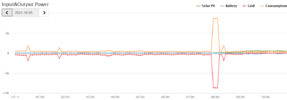Thank you
@Why Not Indeed @Rodders53 I have also heard there is a problem fitting smart meters in my area. It does not really worry me, I see no point in a smart meter as they are today, I can see some point in a split meter so the supplier can switch off non essential services, but this would mean major changes to how the house is wired, going back to old days well before my time when lights and power had different meters and it was illegal to use lighting supplies for power. Although it seemed it was common to do the ironing by plugging into lights.
It seems new EV charging points can be switched off remotely, but can't think of anything I use power for which could be realistically done by remote control, may be when my battery charges, but it only charges off solar anyway, or when my immersion heaters switches on, which again only switches on when there is surplus solar after the battery is fully charged.
As it is we load dishwasher, washing machine and tumble dryer but don't turn them on until surplus solar.
I have watched the Smart meter adds and they seem rather silly, they don't tell you how they will help the home owner, it will make the meter reader redundant, but how does that help me?
Yes I know that, but the alternative sources of accurate time, are available now, should they want to use them.
It seems to be the staggered switching which is so special. Until this post I had not realised the switch on of night rate was staggered. But reading the documents linked to, it seems this was the main point, and the operator could delay the switching on if the demand had not dropped.
However the smart meters only seem to have one outlet, there is no teleswitch to turn on extra loads at a set time. My big power uses dishwasher, washing machine and tumble dryer do have the ability to delay their start, but no option to connect to any trigger device so they can be remotely started, and seems no memory so can't even use a smart socket adaptor to turn them on, as once power is removed they do not auto restart.
As to the safety of items suddenly getting power not so sure, I know anything over 370 watt must auto stop, (552.1.2) but I have send back loads of angle grinders because they don't comply. I think most garden stuff you need to hold some leaver to make it go, dead mans handle sort of thing, but can one be sure all items are like that?


